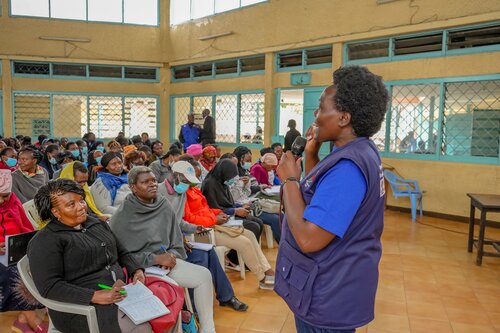UHC2030 hosted its annual UHC Day parliamentarian town hall to...
1 February 2024
UHC2030 welcomes Member States' efforts to advance the draft resolution on social participation for universal health coverage and well-being.

The draft resolution on social participation for universal health coverage and well-being was discussed by the 154th Session of the World Health Organization (WHO)’s Executive Board and is due to be considered at the Seventy-seventh World Health Assembly in May 2024.
Passage of the resolution would mark a significant step towards accelerating equitable progress towards achieving universal health coverage by 2030.
Social participation is critical to ensure people-centered health services and build equitable and resilient health systems that respond to the needs of people and communities in vulnerable and marginalized situations throughout their lives. This includes women and girls, for whom health is often still treated as a privilege rather than a human right.
More inclusive governance in health provides the basis for creating trust with communities in public health policies and programmes, which is indispensable for better outcomes.
The resolution, which is being presented on behalf of a cross-regional group of UN Member States (including Brazil, Colombia, Croatia, Ecuador, Finland, France, Guatemala, Norway, Qatar, Slovakia, Slovenia, Sri Lanka, Thailand, Tunisia and the United States of America) highlights the need for an inclusive and participatory approach to achieving Universal Health Coverage, building on commitments made in the 2023 Political Declaration of the High-level Meeting on Universal Health Coverage.
It crystalizes a shared vision: that in the pursuit of health for all, we must implement, strengthen, and sustain regular and meaningful social participation in decision-making processes across the health policy cycle and at all levels of the system.
Critically the resolution will:
- Strengthen public capabilities and support Member States to implement, strengthen and sustain regular and meaningful social participation in health-related decisions.
- Promote equitable, diverse, and inclusive participation, focusing on those in vulnerable or marginalized situations and ensuring their voices are considered in decisions made.
- Promote gender-sensitive/responsive, age-responsive and disability-inclusive perspectives in the development and implementation of health-related policies and plans.
- Ensure a supportive, conducive environment for dialogue between governments and people, communities, and civil society, to achieve broad and meaningful engagement that can improve health and well-being.
- Support investing and allocating predictable and sustained public resources for social participation.
- Enforce monitoring and evaluation to learn and improve implementation.
- Harmonize technical support on social participation across WHO and the three levels of the Organization.
The pursuit of universal health coverage must involve social participation and ensure an enabling environment for the full participation of civil society and community voices. By embracing this resolution, UHC2030 affirms its commitment to build more inclusive, responsive, and effective health systems governance.
UHC2030 stands ready to support Member States, and all stakeholders, including civil society and communities, in their implementation of this important resolution.
Together, let us forge a path towards a healthier, more equitable future for all.
Ms. Gabriela Cuevas Barron and Dr. Justin Koonin, Co-Chairs of Steering Committee, UHC2030
Photo: © WHO / Billy Miaron
More UHC2030 News
A global health financing emergency threatens progress toward...
UHC2030 at HSR2024: Advancing equity and inclusion in health systems through civil society knowledge
UHC2030, in collaboration with the SUPPORT-SYSTEMS research...
